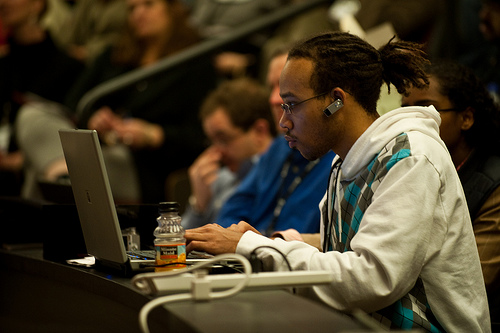
Photo Credit: Josh Hallett (hyku)
There are two types of content creators at any event. The ones who are creating content because they want to, and those who are creating content because they have to (often because they have been sent to “cover” the event for a team or organization). For both, the toughest question to answer is how to do this in a way that results in quality content, but also doesn’t detract from your experience of actually being at an event and participating in it. This post is about a few tips and ideas that should help you deal with that challenge based on what I’ve learned from attending dozens of events and watching how hundreds of people create content:
- Have a purpose. Creating content in a live context can be a great traffic driver to your site, or a brilliant way to connect with those who are sharing ideas and will be reading your efforts soon. Before you get into it, however, make sure you know what you want to get out of it. Are you trying to educate colleagues? Drive more visitors to your site? Have a goal before you start.
- Focus on the 1st take. In a real time environment, you don’t have time to touch up a photo in photoshop or edit a video. A blog post must be 95% right the first time you write it. Speed is the toughest part of covering an event live – and the best way to manage it is to practice getting things right on the first take so you don’t have to go back and fix them.
- Create realistic targets. Do NOT ever think that you can live blog every session you attend and pack your day. That’s the surest way to give yourself a major headache and feelings of inadequacy. Even pro bloggers who are covering events professionally take breaks – and your goal should be to share great content, not a high volume of crappy content.
- Publish nuggets, not manifestos. Think about this – real time means you need to get content up and out quickly. Using shorter content sharing quick thoughts is much better for this. So save the big ideas for a recap post or something that comes later and focus on speed in the short term. Twitter is great for this as well – but don’t just tweet everything a speaker says. Instead, focus on finding the best soundbites. And always tag your content with the hashtag (keyword) being used by people at the event (or create one if one does not exist).
- Have a point of view. Speed doesn’t mean lack of substance, however. The worst kind of content to come out of events is where people share what is happening on stage in a word for word “book report style” format. Most social media events already have someone assigned to do that. And trust me, you don’t want to be “that guy (or girl).” Always have a point of view on what is happening on stage.
- Share the real pulse of the event. Often the most interesting thing about an event isn’t just what people say, but the intangibles about the event. Did everyone head back to their hotel rooms during the breaks or were they networking? What sessions were the most popular? Keep your eye out for broader trends that help you to understand the vibe and pulse of the event on a greater level.
- Offer an insider perspective. Being an attendee or speaker at an event gives you a unique insider view of what is happening. If you can, try to share as much of that experience online as you can. Remember, the people following live are most likely those who were interested in the event but could not make it themselves, so give them a good look inside the event.
- Get help on content promotion. Creating content from an event in real time is complicated enough, but you will probably find yourself simply running out to time when it comes to effectively promoting all the content you’re creating. So get some help to submit your posts to Digg and other sites, or to point people to some of your content. Promotion is great real time, but it’s most effective if you can split the duties.
- Represent the virtual attendees. When you find yourself with an audience following your content in a live fashion, you have the option to be their representative at an event. This means you could poll your audience and ask a question in a session on their behalf – or ask others to follow up directly with those individuals as well. Be their voice and they will thank you for it.
- Do a recap. No matter how many posts or tweets you get out during an event, always do a recap of the event and what you learned as part of your effort. Often, you’ll find this post lets you talk about things you just didn’t have time to during the event. And it will most probably be your most visited effort from the entire event.






WE RECENTLY REMOVED COMMENTING - LEARN WHY HERE >